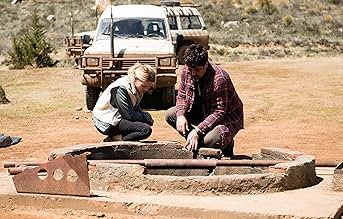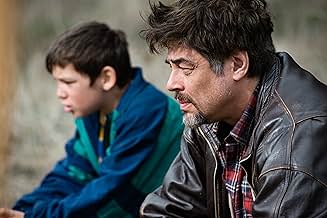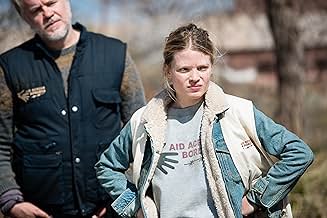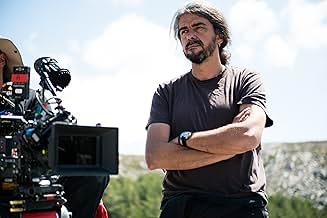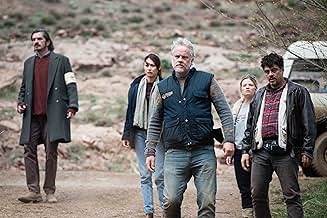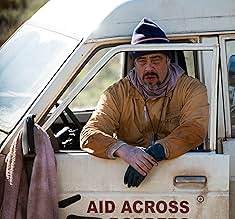CALIFICACIÓN DE IMDb
6.8/10
24 k
TU CALIFICACIÓN
Un grupo de trabajadores humanitarios trabajan para resolver una crisis en una zona de conflicto armado.Un grupo de trabajadores humanitarios trabajan para resolver una crisis en una zona de conflicto armado.Un grupo de trabajadores humanitarios trabajan para resolver una crisis en una zona de conflicto armado.
- Dirección
- Guionistas
- Elenco
- Premios
- 4 premios ganados y 24 nominaciones en total
- Dirección
- Guionistas
- Todo el elenco y el equipo
- Producción, taquilla y más en IMDbPro
Opiniones destacadas
I just saw a Spanish film that probably enjoyed a limited release in the U.S., although the dialogue is mostly in English – A Perfect Day. In the film, a team of aid workers faces a problem, a corpse is contaminating a well that provides the only potable water in the region, since two other wells are surrounded by mines and cannot be used. The film follows the group as they try to obtain a rope to lift the body out of the well, and examines the difficulties of executing such a small task in a war zone, in this case, the waning days of the Bosnian conflict.
The film resonated with me on several levels. First, of course, I live in the Balkans now, so the language and setting was familiar. (Now I know "konopac" means rope and "bunar" means well!) The landscape in some of the scenes was amazing, and makes me curious to see more of Bosnia now. Second, the cast itself is multinational, reflecting the multinational character of international assistance efforts. This is familiar to me too, since I work in a multinational OSCE Mission. The civilian-military interaction was all too familiar, as were the many scenes with Stryker armored personnel carriers, a common sight during my time in Iraq.
I thought the film provided a very good feel for the frustrations of development work in a war setting. In addition, the dialogue and acting were great. The impressive cast features American Tim Robbins, Spaniard Benicio del Toro, Ukrainian Olga Kurylenko (who was a Bond girl in A Quantum of Solace), Frenchwoman Melanie Thierry, and Bosnian Fedja Stukan. At one point, one of the characters, seeing Olga Kurylenko for the first time, mutters under his breath, "And so where is she from – Models without Borders?" The sub-plot involving the young Bosnian boy, Nikola, who attaches himself to the team, is also great.
This is a powerful film that is authentic in its treatment. I recommend it.
The film resonated with me on several levels. First, of course, I live in the Balkans now, so the language and setting was familiar. (Now I know "konopac" means rope and "bunar" means well!) The landscape in some of the scenes was amazing, and makes me curious to see more of Bosnia now. Second, the cast itself is multinational, reflecting the multinational character of international assistance efforts. This is familiar to me too, since I work in a multinational OSCE Mission. The civilian-military interaction was all too familiar, as were the many scenes with Stryker armored personnel carriers, a common sight during my time in Iraq.
I thought the film provided a very good feel for the frustrations of development work in a war setting. In addition, the dialogue and acting were great. The impressive cast features American Tim Robbins, Spaniard Benicio del Toro, Ukrainian Olga Kurylenko (who was a Bond girl in A Quantum of Solace), Frenchwoman Melanie Thierry, and Bosnian Fedja Stukan. At one point, one of the characters, seeing Olga Kurylenko for the first time, mutters under his breath, "And so where is she from – Models without Borders?" The sub-plot involving the young Bosnian boy, Nikola, who attaches himself to the team, is also great.
This is a powerful film that is authentic in its treatment. I recommend it.
It is ironic that war is the biggest industry on the planet. Its wider industrial domain includes warrior politicians, arms manufacturers and military forces. Less acknowledged, it also includes those who perpetually seek amelioration of its consequences like the United Nations and various humanitarian aid agencies. All of those groups regularly star in movies but aid workers get little cinematic glory. It is in this wider context that the Spanish-directed film A Perfect Day (2015) is an unusual and original addition to black comedy war dramas, least of all because the way it avoids typical war movie scenarios and narratives. It covers 'one perfect day' during the military wind-down in the Balkans crisis of mid 1990s and is a refreshing, entertaining and informative insight into the role of aid workers when the big guns go quiet.
The story begins and ends with the image of a big fat corpse in a well, dumped deliberately to pollute village water. In between we see the frantic efforts by a small group of aid workers to find scarce rope that can haul him out, and rope becomes a metaphor to join several unconnected incidents that make up the narrative. There Is no sound of bombs or signs of fighting; we only see a beautiful country full of silent monuments to the devastation of war. Bombed-out ghosts of villages, homeless children, poverty and toxic hygiene are some of an aid worker's challenges and black humour is the universal panacea for coping. On this day, the group must deal with the risk of hidden road mines in cattle carcasses, villager distrust and military animosity towards interfering aid workers, and a United Nations bureaucracy that shows little sensitivity towards dispossessed victims of war. Oh, and find a soccer ball for a young boy.
As with all character-driven films, this one is less about what happens and more about what it is like to be there. The characters built with re-purposed M.A.S.H. traits that are likable, funny and plausible, and the acting is top-class. There are no glory hounds in the group and each has their own coping strengths and emotional foibles. The director orchestrates the characters and sub- stories with perfect tempo to produce a story that is totally engaging if not gripping. You might wonder how a group of loosely disciplined and unaccountable workers can roam freely across a war-ravaged country, or whether the final scene is actually a political statement about their true value. If so, the film has made its mark.
The story begins and ends with the image of a big fat corpse in a well, dumped deliberately to pollute village water. In between we see the frantic efforts by a small group of aid workers to find scarce rope that can haul him out, and rope becomes a metaphor to join several unconnected incidents that make up the narrative. There Is no sound of bombs or signs of fighting; we only see a beautiful country full of silent monuments to the devastation of war. Bombed-out ghosts of villages, homeless children, poverty and toxic hygiene are some of an aid worker's challenges and black humour is the universal panacea for coping. On this day, the group must deal with the risk of hidden road mines in cattle carcasses, villager distrust and military animosity towards interfering aid workers, and a United Nations bureaucracy that shows little sensitivity towards dispossessed victims of war. Oh, and find a soccer ball for a young boy.
As with all character-driven films, this one is less about what happens and more about what it is like to be there. The characters built with re-purposed M.A.S.H. traits that are likable, funny and plausible, and the acting is top-class. There are no glory hounds in the group and each has their own coping strengths and emotional foibles. The director orchestrates the characters and sub- stories with perfect tempo to produce a story that is totally engaging if not gripping. You might wonder how a group of loosely disciplined and unaccountable workers can roam freely across a war-ravaged country, or whether the final scene is actually a political statement about their true value. If so, the film has made its mark.
Spanish physician Paula Farias (Doctors without Borders) wrote a novel based on her experience in the Balkans and the present film (an English spoken Spanish production) represents the cinematographic transposition of her work.
It's a lovely movie with no plot: it just narrates how common people could spend a day (actually a couple of days) trying to help, in the middle of events enormously bigger than them.
There are no heroes here, only experience. No guilt, just sorrow. No right way to do things besides thinking and wishing to care. And then there is fate, of course.
A (good) way to look at the world.
It's a lovely movie with no plot: it just narrates how common people could spend a day (actually a couple of days) trying to help, in the middle of events enormously bigger than them.
There are no heroes here, only experience. No guilt, just sorrow. No right way to do things besides thinking and wishing to care. And then there is fate, of course.
A (good) way to look at the world.
Foreign films rarely get the proper recognition in the English speaking world, be that the US or Great Britain. Only recently have foreign films been allowed to compete in categories other than Best Foreign film at the Academy Awards and the Golden Globes still relegate them to the Foreign Film category. If we look at the box-office results we see an even more drastic condition. The highest grossing foreign film of all time in the US is Crouching Tiger, Hidden Dragon, which made $127 million, something the small Pitch Perfect film achieved in 2011 which much less effort. But being shunned from awards and shut out from the box office doesn't mean foreign films don't have quality, just look at the great Italian films Cinema Paradiso or Life is Beautiful, or at Jacques Tati's film repertoire, Almodovar and Amenabar in Spain, Michael Haneke in Austria, and the great master Miyazaki and Kurozawa in Japan. This brings us to A Perfect Day the newest film from Spanish director Fernando Leon de Aranoa. The film is made by Spaniards, told in English, and takes place in the Balkans, a very curious mix, which nonetheless produced one of the best films of the year.
A Perfect Day tells the story of a group of aid workers working in the midst of the Balkan crisis in 1995. We have Mambru (Benicio del Toro) the group's unofficial leader and head of security, the wisecracking B (Tim Robbins), the rookie Sophie (Melanie Thierry), and their translator Damir (Fedja Stukan). The film opens with Mambru trying to take a dead body out of a town well. It's the body of an obese man, which later symbolizes of the dreading weight that the group is trying to relieve without help from the UN or the locals, all trying to help a country they barely know. The story intensifies when Mambru picks up a lost local kid named Nikola (Eldar Residovic) who had his soccer ball stolen by bullies, and finally Mambru's ex shows up (Olga Kurylenko) to evaluate the situation in the Balkans. Essentially the movie is a road-trip through the Bosnian countryside, letting you catch a glimpse of the situation that the locals lived in (and still live in today).
What most surprised me about A Perfect Day was the incredible balance it has. When touching upon the subject of war, it is very easy to be extreme. Extreme in the sense that you show a gore- fest and lots of blood and death, or an extreme where you try to cover up everything and have only descriptions from characters of passed events. A Perfect Day achieves its goal of brutalizing war with simple acts, like when a kid pulls out a gun when fighting over a ball, or when a store-owner can't sell his rope because he has them reserved for hangings, or when a shy adolescent watches over an empty warehouse, but is spurred with hope for protecting its flag. It is these little details littered in the story that really give you the sense of suffering and dread that can be seen in times of war.
In terms of the acting, it was also very well balanced. You had Robbins as the comic relief, and Del Toro as the speaker of truth. Both actors give an incredible performance, with visible yet admirable improvisation. Meanwhile the supporting cast also is incredibly solid. The more known names of Olga Kurylenko and Melanie Thierry do a fine job, but the surprises here were in the local actors: Fedja Stukan and Eldar Residovic who both give incredibly raw and layered performances that have us longing to console them, yet you never once pity them in the undignified sense.
Then the cinematography is also very simple, but yet contains a few flourishes and Director of Photography Alex Catalan (Marshland, Unit 7) gives the movie a cold almost wintery look that makes the message and harshness of the story fall sharper and hit you harder.
Finally, the script was incredibly witty and quick. The character development in the two hours of running time is so smooth you barely notice it, but when comparing the characters at the beginning and at the end of the movie you see how subtle Leon de Aranoa was (especially with the character Sophie). The dialogue is absolutely delicious, with the best being quirky exchanges between B and Mambru.
In the end this film, again, exemplifies that "there is life outside the US" and that foreign cinema (in particular Spanish cinema) is growing and cultivating fresh crops of new artists. And in a world of war and sorrow, art is sometimes the only window of hope.
A Perfect Day tells the story of a group of aid workers working in the midst of the Balkan crisis in 1995. We have Mambru (Benicio del Toro) the group's unofficial leader and head of security, the wisecracking B (Tim Robbins), the rookie Sophie (Melanie Thierry), and their translator Damir (Fedja Stukan). The film opens with Mambru trying to take a dead body out of a town well. It's the body of an obese man, which later symbolizes of the dreading weight that the group is trying to relieve without help from the UN or the locals, all trying to help a country they barely know. The story intensifies when Mambru picks up a lost local kid named Nikola (Eldar Residovic) who had his soccer ball stolen by bullies, and finally Mambru's ex shows up (Olga Kurylenko) to evaluate the situation in the Balkans. Essentially the movie is a road-trip through the Bosnian countryside, letting you catch a glimpse of the situation that the locals lived in (and still live in today).
What most surprised me about A Perfect Day was the incredible balance it has. When touching upon the subject of war, it is very easy to be extreme. Extreme in the sense that you show a gore- fest and lots of blood and death, or an extreme where you try to cover up everything and have only descriptions from characters of passed events. A Perfect Day achieves its goal of brutalizing war with simple acts, like when a kid pulls out a gun when fighting over a ball, or when a store-owner can't sell his rope because he has them reserved for hangings, or when a shy adolescent watches over an empty warehouse, but is spurred with hope for protecting its flag. It is these little details littered in the story that really give you the sense of suffering and dread that can be seen in times of war.
In terms of the acting, it was also very well balanced. You had Robbins as the comic relief, and Del Toro as the speaker of truth. Both actors give an incredible performance, with visible yet admirable improvisation. Meanwhile the supporting cast also is incredibly solid. The more known names of Olga Kurylenko and Melanie Thierry do a fine job, but the surprises here were in the local actors: Fedja Stukan and Eldar Residovic who both give incredibly raw and layered performances that have us longing to console them, yet you never once pity them in the undignified sense.
Then the cinematography is also very simple, but yet contains a few flourishes and Director of Photography Alex Catalan (Marshland, Unit 7) gives the movie a cold almost wintery look that makes the message and harshness of the story fall sharper and hit you harder.
Finally, the script was incredibly witty and quick. The character development in the two hours of running time is so smooth you barely notice it, but when comparing the characters at the beginning and at the end of the movie you see how subtle Leon de Aranoa was (especially with the character Sophie). The dialogue is absolutely delicious, with the best being quirky exchanges between B and Mambru.
In the end this film, again, exemplifies that "there is life outside the US" and that foreign cinema (in particular Spanish cinema) is growing and cultivating fresh crops of new artists. And in a world of war and sorrow, art is sometimes the only window of hope.
A Perfect Day tells the story of a group of aid workers during the Balkan War. The daily problems they encounter to do their job as good as possible. Don't expect much action or so because the story is just them trying to find a piece of rope so they can extract a dead body out of a well. Seems easy but in a hostile environment where all the concerned parties are not willing to help it becomes a challenge. Even though there is not much action the story is enjoyable to watch. Add on that first class actors and you get a good movie that is worth a watch. Benicio Del Toro and Tim Robbins are always a delight to watch and in A Perfect Day they do what we are used of them. The script is good, the actors are good, the filming is good, and there is even a bit of humor. Entertaining movie.
¿Sabías que…?
- TriviaAfter the public screening of the film during the Quinzaine des Réalisateurs 2015 (director's fortnight) at Cannes Festival, on the 16th of May 2015, the director and actors present (Benicio Del Toro, Mélanie Thierry) received a five-minute standing ovation.
- ErroresNear the start when B and Sophie are driving along the cliff, the aerial shot shows the cliff to be on the left of the road. Then a shot from inside the car shows trees in the background where the cliff was. The when they stop in front of the dead cow, the cliff is on the right side.
- Créditos curiososDuring the opening, credits are introduced as if created out of the live motion of a drop of water. This water theme continues through the acting credits.
- Bandas sonorasSweet Dreams (Are Made of This)
Written by Annie Lennox and David A. Stewart (as David Stewart)
Performed by Marilyn Manson
Selecciones populares
Inicia sesión para calificar y agrega a la lista de videos para obtener recomendaciones personalizadas
- How long is A Perfect Day?Con tecnología de Alexa
Detalles
- Fecha de lanzamiento
- País de origen
- Sitios oficiales
- Idiomas
- También se conoce como
- Ідеальний день
- Locaciones de filmación
- Productoras
- Ver más créditos de la compañía en IMDbPro
Taquilla
- Total en EE. UU. y Canadá
- USD 14,044
- Total a nivel mundial
- USD 4,069,691
- Tiempo de ejecución1 hora 46 minutos
- Color
- Relación de aspecto
- 2.35 : 1
Contribuir a esta página
Sugiere una edición o agrega el contenido que falta

Principales brechas de datos
By what name was A Perfect Day (2015) officially released in India in English?
Responda





